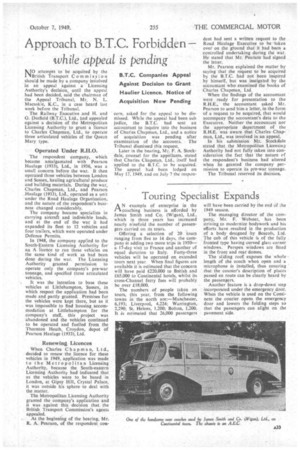Approach to B.T.C. Forbidden—
Page 67

If you've noticed an error in this article please click here to report it so we can fix it.
while appeal is pending
B.T.C. Companies Appeal Against Decision to Grant Haulier Licence. Notice of Acquisition Now Pending
NO attempts to be acquired by the British Transport Commission should be made by a company involved in an appeal against a Licensing Authority's decision, until the appeal had been decided, said the chairman of the Appeal Tribunal; Mr. N. L. Maeaskie, K.C., in a case heard last week before the Tribunal.
• The Railway Executive and H. and G. Duffield (B.T.C.), Ltd., had appealed against a decision of the Metropolitan Licensing Authority to grant a licence to Charles Chapman, Ltd., to operate three articulated vehicles of the Queen Mary type.
Operated Under R.H.O.
The respondent company, which became amalgamated with Pearson Haulage (1933), Ltd., in 1936, was a small concern before the war. It then operated three vehicles between London and Sussex, hauling agricultural produce and building materials. During the war, Charles Chapman, Ltd., and Pearson _Haulage (1933), Ltd., operated as a unit under the Road Haulage Organization, and the nature of the respondent's business changed considerably.
The company became specialists in carrying aircraft and indivisible loads, and at the end of the war it had expanded its fleet to 12 vehicles and four trailers, which were operated under Defence Permits, In 1948, the company applied to the South-Eastern Licensing Authority for an A licence to run these vehicles on the same kind of work as had been done during the war. The Licensing Authority granted permission to operate only the company's pre-War
. tonnage, and specified three articulated vehicles.
It was the intention to base these vehicles at Littlehampton, Sussex, in which respect the application had been made and partly granted. Premises for the vehicles were kept there, but as it was impossible to find housing accommodation at Littlehampton for the company's staff, this project was abandoned and the vehicles continued to be operated and fuelled from the Thornton Heath, Croydon, depot of Pearson Haulage (1933), Ltd.
Renewing Licences When Charles Chapm a n, L t d., decided to renew the licence for these vehicles in 1949, application was made to the Metropolitan Licensing Authority, because the South-eastern Licensing Authority had indicated that as the vehicles were to be based in London, at Gipsy Hill, Crystal Palace, it was outside his sphere to deal with the matter.
The Metropolitan Licensing Authority granted the company's application and it was against this decision that the British Transport Commission's agents appealed.
At the beginning of the hearing, Mr. R. A. Pearson, of the respondent con
cern, asked for the appeal to be dismissed. While the appeal had been sub judice, the B.T.C. had sent an accountant to inquire into the business of Charles Chapman, Ltd., and a notice of acquisition was pending after examination of the accounts. • The Tribunal dismissed this request.
Later in the hearing, Mr. F. A. Stockdale, counsel for the appellants, stated that Charles Chapman, Ltd., itself had applied to the B.T.C. to be acquired. The appeal had been lodged on May 1.7, 1949, and on July 7 the respon dent had sent a written request to the Road Haulage Executive to be taken over on the ground that it had been a controlled undertaking during the war. He stated that Mr. -Pearson had signed the letter.
Mr. Pearson explained the matter by saying that the request to be acquired by the B.T.C. had not been inspired by himself, but was instigated by the accountant who examined the books of Charles Chapman, Ltd.
When the findings of the accountant were ready for presentation to the R.H.E., the accountant asked Mr. Pearson to send him a letter, in the form of a request to be acquired, that would accompany the accountant's data to the Executive. Neither the accountant nor the appropriate department of the R.H.F. was aware that CharlesChap-' man, Ltd., was invoked in an appeal.
In his submission Mr. Stockdale stated that the Metropolitan Licensing Authority had not fully taken into consideration the fact that the nature of the respondent's business had altered when he granted the company permission to operate its pre-war tonnage.
The Tribunal reserved its decision.




































































































